unit3-Have-you-ever-done-a-part-time-job教学设计
高教版中职英语(基础模块 第2册)Unit 3《Have you ever done a
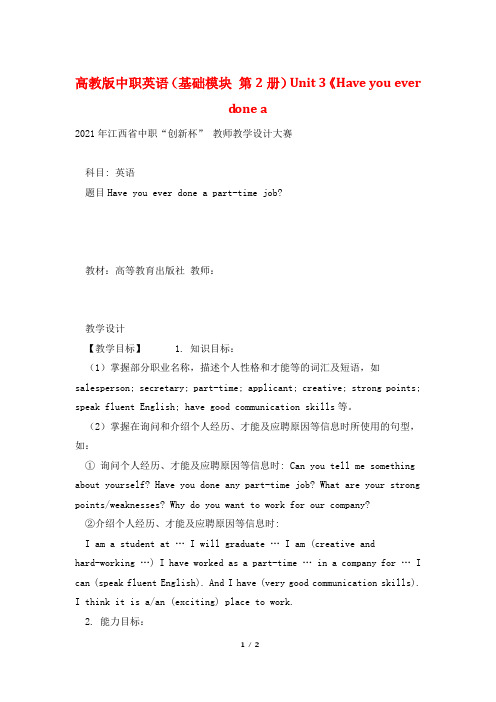
高教版中职英语(基础模块第2册)Unit 3《Have you everd one a2021年江西省中职“创新杯”教师教学设计大赛科目: 英语题目Have you ever done a part-time job?教材:高等教育出版社教师:教学设计【教学目标】 1. 知识目标:(1)掌握部分职业名称,描述个人性格和才能等的词汇及短语,如salesperson; secretary; part-time; applicant; creative; strong points; speak fluent English; have good communication skills等。
(2)掌握在询问和介绍个人经历、才能及应聘原因等信息时所使用的句型,如:①询问个人经历、才能及应聘原因等信息时: Can you tell me something about yourself? Have you done any part-time job? What are your strong points/weaknesses? Why do you want to work for our company?②介绍个人经历、才能及应聘原因等信息时:I am a student at … I will graduate … I am (creative andhard-working ...) I have worked as a part-time ... in a company for (I)can (speak fluent English). And I have (very good communication skills).I think it is a/an (exciting) place to work.2. 能力目标:(1)学生能听懂应聘面试时询问和介绍个人经历、才能及应聘原因等信息的简单对话。
unit3-Have-you-ever-done-a-part-time-job教学设计
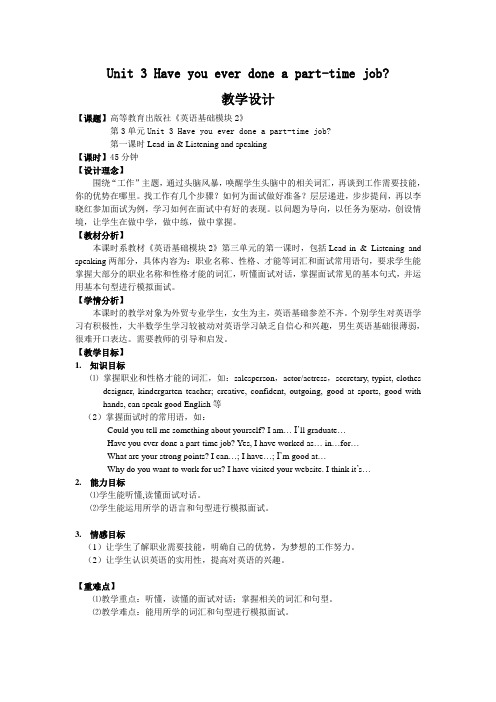
Unit 3 Have you ever done a part-time job?教学设计【课题】高等教育出版社《英语基础模块2》第3单元Unit 3 Have you ever done a part-time job?第一课时Lead-in & Listening and speaking【课时】45分钟【设计理念】围绕“工作”主题,通过头脑风暴,唤醒学生头脑中的相关词汇,再谈到工作需要技能,你的优势在哪里。
找工作有几个步骤?如何为面试做好准备?层层递进,步步提问,再以李晓红参加面试为例,学习如何在面试中有好的表现。
以问题为导向,以任务为驱动,创设情境,让学生在做中学,做中练,做中掌握。
【教材分析】本课时系教材《英语基础模块2》第三单元的第一课时,包括Lead-in & Listening and speaking两部分,具体内容为:职业名称、性格、才能等词汇和面试常用语句,要求学生能掌握大部分的职业名称和性格才能的词汇,听懂面试对话,掌握面试常见的基本句式,并运用基本句型进行模拟面试。
【学情分析】本课时的教学对象为外贸专业学生,女生为主,英语基础参差不齐。
个别学生对英语学习有积极性,大半数学生学习较被动对英语学习缺乏自信心和兴趣,男生英语基础很薄弱,很难开口表达。
需要教师的引导和启发。
【教学目标】1.知识目标⑴掌握职业和性格才能的词汇,如:salesperson,actor/actress,secretary, typist, clothesdesigner, kindergarten teacher; creative, confident, outgoing, good at sports, good with hands, can speak good English等(2)掌握面试时的常用语,如:Could you tell me something about yourself? I am…I’ll graduate…Have you ever done a part-time job? Yes, I have worked as… in…for…What are your strong points? I can…; I have…; I’m good at…Why do you want to work for us? I have visited your website. I think it’s…2.能力目标⑴学生能听懂,读懂面试对话。
中职英语高教版基础模块第二册Unit 3 Have you ever done说课课件

教学设计
教学过程
教学反思
课前准备
怕学、不学
课堂实施
枯燥、抽象
课后提升
检验
小组合作 主动学习
图片 歌曲、视频 游戏 有趣、具体
创设情境
提升
Part three
本节课的整体设计思路是基于内容与 学情,采用以读促写的教学策略,即 利用阅读即语言知识的输入来促进写 作即语言知识的输出。并通过开展丰 富多样的教学活动,让学生在做中学, 做中练,做中掌握,凸显学习的主体 性。
教学分析
教学目标
教学设计
教学过程
教学反思
《中职英语课程标准》
教材内容 教学对象 畏惧心理
——注重基础,强调实用 ——主要围绕工作招聘展开
——职业教育,英语基础相对落后于普通高中生,对英语多有
知识 目标
➢学生掌握关于描述职业的名称、 其相应的能力要求的词汇、短语; ➢学生掌握简单招聘广告中的典
型句型;
说课
目录
01 教学分析 02 教学设计 03 教学过程 04 教学反思
教学分析
教学内容
教学设计
教学过程
教学反思
内容
《英语基础模块》第二版第二册第三单元 Reading and
Writing Have you ever done a part-time job?
基于lead-in(导入) 和listening and speaking (听说)部分内容的基础上,进行了深化和拓展, 要求学生进一步理解职业及其能力要求,并在能读 懂招聘广告的基础上,进行招聘广告的书写。 本部分内容贴近学生生活,与学生的就业息息相关, 实用性较大.
整体而言,教学思路清晰,教学过程衔接自然, 层层递进,由简入难,符合学生的认知水平和接受 能力。并结合自主探索、合作交流的学习方法展开 教学,能引导学生一步一步达成教学目标。
step-by-step3000-Unit4答案

▪ e.g. trees laden with apples
▪ modify: change slightly, esp. to make it less extreme or to improve it.
▪ 2) résumé: CV (curriculum vitae /kə’rɪkjuləm ‘viːtaɪ; kə’rɪkjələmˋvitaɪ/); a short written account of a person’s education and past employment, used esp. when they are looking for a new job.
Part I Warming up
▪ Lead-in: (Discussion) ➢What jobs do you like to do in the future? ➢Do you want to be a “白骨精”? (白领,骨
干,精英) (white-collar, key member/backbone, elite) ➢What’s your opinion for finding a job and making a career?
▪ The grasping of the listening skills of giving outline;
▪ The grasping of new expressions and language points;
▪ The understanding of the background knowledge;
copy of diploma to 943 West Avenue; Syracuse, ▪ NY 18640
unit3Have you ever done a part-time job教学提纲
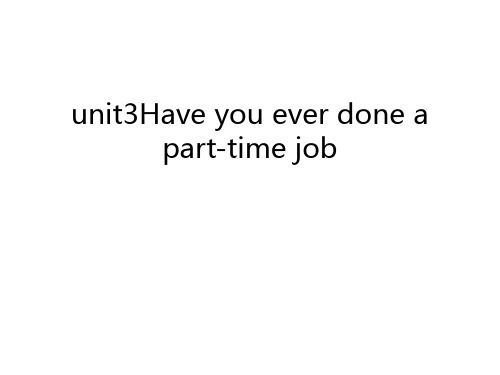
If you are interested, please call at…
Please visit our website for more information
How is your learning?
good
so-so
not good
Step Ⅴ Summary (5mins) Make comments
Teaching Methods
Communicative
1
According to the modern social communication teaching theories
2
Aids
Task- based Multi-media
Aids Blackboard
Part 4 Learning Methods
StepⅠ Lead-in (1min)
Job advertisement
Step Ⅱ Pre-reading (8 mins)
The contents of job advertisement
Words
organization company communication website experience pressure
According to the features of vocational students
Competition
Discussion
Cooperation
Part 5 Teaching Procedure
Lead-in Pre-Reading
While-reading Post-reading Summary Homework Blackboard Design
Unit 3 学习资料完整版

Unit 3eful expressions2.Critical thinking1)What kind of digital products do you usually use? What do youusually do with them in both study and daily life?2)What have your university done to meet the requirement of thisdigital age? What do you expect your university to do next?3)What would life be like without the Internet or smartphones?3.Main structure of the passageIntroduction: The college today is being transformed into a new age of electronics by a fleet of laptops, smartphones and Internet connection 24 hours a day. (Para. 1)How the transformation influences student’s campus lifePara. 2: How students use new technologies in and out of class.Para. 3: Colleges have become the most Internet-accessible spots in the world.Para. 4: How students feel about wireless Internet access.Para. 5: Specific examples on how the new electronic device helping students’ learning.Para. 6: Why non-stop Internet connection is becoming indispensable for the storage and management of information.How the transformation influences colleges and universities?Para. 7: How fast information technology has developed on campus.Para. 8: What did one college do in order not to have technology inferiority complex?Para. 9: Some universities try their best to maintain competitive advantage.Para. 10-11: To attract students, colleges are competing with thebest Internet services, and another example of how colleges help students.Conclusion: The anywhere-anytime access has yielded amazing benefits. With the widespread application of laptops and computer sciences, we’re going to produce a generation of problem-solvers and intelligent thinkers, which is indispensable for the future of the world.(Para. 12)nguage pointsWords and expressions to talk about high technology and digital products:Words and expressions about college education1.Sth., long a … of …, is being transformed into …, and …用于形容“某物的转变或变化”。
中职英语Unit3_现在完成时
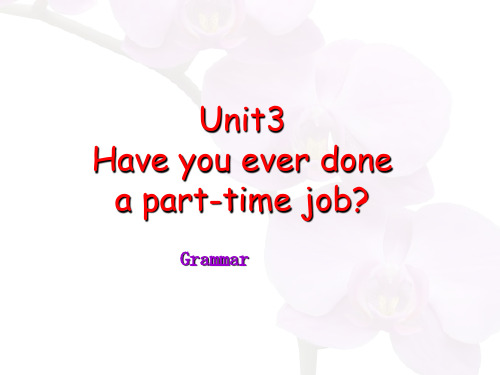
按要求改变句子。 1. She has done her homework. (改否定句)
She hasn’t done her homework.
2. She has already told us the news. (改否定 句)
She hasn’t told us the news yet.
for __________ a year.
Describe the pictures to show what Sara has done recently.
study English / in an evening school / for 3 months Sara has studied English in an evening school for three months.
Unit3 Have you ever done a part-time job?
Grammar
现在完成时 ( present perfect tense)
past
present(now)
future
I bought an apple. I have an apple.
past
one minute ago
never(从不) I have never seen him.
before(以前) Have
you seen the film before? since(自从…以来) I’ve worked in the school since 1999. for(长达) He’s lived in Shenzhen for 6 years. in the past several days / weeks/ years(在过 去的…) recently( 最近 ) I have not written to my parents recently. so far(到目前为止) So far she has learned 5 English songs. up to now(到目前为止)
基础模块二Unit1-Unit5期末考试复习题

三穗职校基础模块二Unit1-Unit5期末考试复习资料(一)班级_________ 姓名_________ 成绩_________一、单项选择1. A. fan B. age C. fat D. manager2. A. teach B. bread C. head D. weather3. A. cloudy B. color C. cook D. nice4. A. snowy B. down C. window D. yellow5. A. telephone B. get C. secretary D. egg6. A. food B. wood C. foot D. good7.A. stair B. repair C. here D. fair8. A. school B. church C. change D. touch9.A. item B. dish C. invite D. price10. A. day B. may C. way D. saysUnit1-Unit211. parent A. everyday12. amusing B. to cause to feel pain13. vacation C. father or mother14. hurt D. funny15. daily E. holiday16. gym F. money in the form of bills or coins17. rent G. clever; bright18. smart H. pay for the use of something19. cash I. dull; uninteresting20. boring J. room or hall with for physical exercise or trainingUnit3----Unit421. creative A. a place or an address containing web pages22. interview B. a particular job23. fluent C. able to speak a language very well24. website D. making new things or using new ideas25. position E. a meeting where asked if he or she is suitable for a job.26.expensive F. relaxing ;at ease27. strange G. the time at the beginning ad end of the working day.28. rush hour H. dear, not cheap.fortable I. a place, such as a factory or an office30. workplace J. unusual; not known ;unfamiliarUnit531. advise A. the heaviness of an object32.pale B. to recommend : suggest33. keen C. the usual food and drink of a person or animal34. diet D. describe a very intense liking or a fond of something35.weight I. whitish in complexion : light; weak36.Y ou must be thirsty, I‟ll get you something______A. ateB. eatenC. to drinkD. drinking37.I can‟t find _______. It‟s much too boring.A. something interestingB. nothing interestingC. interesting nothingD. anything interesting38.Mother _____ us stories when we were young.A. was used to tellB. is used to tellingC. used to tellD. used to telling39.A number of students ____ good at math in our class.A. amB. isC. areD. be40.She left without ________goodbyeA. saysB. sayingC. to sayD. said41. _____ fine weather today! Le t‟s go to play.A. WhatB. What aC. HowD. How a42. The house is not as clean as usual .It needs_______A. to cleanB. cleaningC. cleanedD. clean43. I heard him ____in the next room.A. singsB. singingC. to singD. sang44. She was seen ______model ships in the roomA. madeB. to makeC. makesD. making45.My sister has ____ useful English dictionary.A. aB. theC./D. an46.If he _____ tomorrow . I‟ll go to see himA. doesn‟tB. won‟t comeC. would comeD. came47.Not only I but also Lucy and Lily ____ tired of having one examination after another.A. isB. areC. amD. be48. It _____ Jack 20 minutes _____ the math problem yesterdayA. took; to work outB. takes ; to work outC. has taken; working outD. is taking; working out49. Y our brother came to see you ,__________?A. does heB. doesn‟t heC. did heD. didn‟t he50. .The people heard the bad news that the hero _____ for several hours.A. has diedB. has passed awayC. had diedD. had passed away51.The old woman _____ here since 2000.A. livesB. livingC. was livingD. has lived52. Would you please drive a little faster? My flight______A. is taking offB. has taken offC. had taken offD. was taking off53. She spent three days_____ her final papers(论文)A. readingB. to readC. readD. to reading54._____ he is ,____he feelsA. The busier ;the happiestB. The busier; the happierC. The busiest ; the happierD. The busiest; the happiest55.There is _____water in that bottle, will you please go and some?A. a littleB. a fewC. littleD. few56. I am looking forward to _____ my good friend.A. seeB. sawC. seeingD. seen57.It is no good _____ to do it again.A. to tryB. tryingC. triesD. try58. He enjoy _____ football.A. playB. playingC. playsD. played59.--- What would you like?--- I‟d like coffee _______ sugar in it.A. orB. withC. toD. for60. The water is too hot .We‟d better _____ right now .A. not to drinkB. don‟t drinkC. not drinkD. drink not四、完形填空阅读下面短文,从短文后所给的A、B、C三个选项中选出一个可以填入题前的括号内。
高教版中职英语(基础模块 第2册)Unit 3《Have you ever done a part time job》2PPT课件
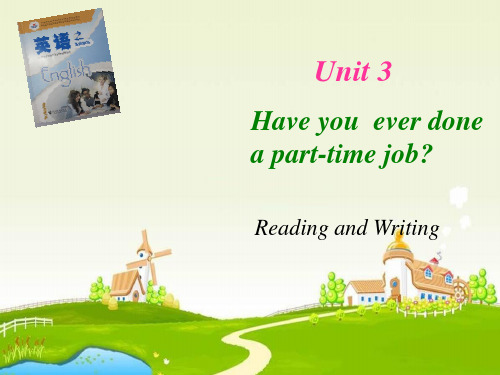
organization company
quality
website
position
marketing assistant
Useful Expressห้องสมุดไป่ตู้ons
two-year working experienc
have good communication skill
We are looking for …
Step Ⅳ Post-reading (12mins)
Activity 1 : Group discussion Activity 2 : Fill the form Activity 3 : Think
Step Ⅴ Summary (5mins)
Make self-check
New Words
PK
marketing assistant have good communication skills be able to work under pressure If you are interested… Please call…at… Please visit … for more information.
Part 3
Teaching Methods
Communicative
1
According to the modern social communication teaching theories
2
Aids
Task- based Multi-media
Aids Blackboard
Part 4 Learning Methods
According to the《New English Curriculum Criterion》
Unit 3 Have you ever done a part-time job_

Unit 3 Have you ever done a part-timejob?Lead-in(Page 41 Activity 1)(本段可用于补充阅读,帮助学生确定适合自己的职业,激发学生兴趣)从你的性格看你适合怎样的工作When you look for a job, you will probably take salary, location and chance for advancement into consideration. Most people don't stop to consider that they should be choosing a career based on the type of person they are. You are going to spend a large part of your life at work. Therefore, you should choose a career that is compatible with which personality you really are.These personality types were developed by career psychologist John Holland, who identifies six general types of people. Here are some basic personality types and careers that go with them:1. Realistic Personalities现实派If you are a realistic personality you are hands-on, practical and straightforward. No beating around the bush for you!Civil Engineers土木工程师Surveyors鉴定员Computer Support Specialists电脑工程师Electrician电工Orthodontist牙医2. Investigative Personalities观察型You question any idea that doesn't have cold, hard facts behind it. You spend time gathering information before you take action, or make a decision. Your investigators are scientific, intellectual and analytical.Computer Software Engineer and Developers软件工程开发人员Anesthesiologists麻醉专家Doctors (Family and General Practitioners)家庭医生Professor教授Librarian图书管理员Veterinarian兽医3.Artistic Personalities艺术派Not only are artistic people creative and imaginative, they are also great problem solvers. They bring another way of looking at something. Artistic people are intuitive.Multi-Media Artists多媒体Art, Drama, and Music Teachers, Postsecondary美术,戏剧或音乐老师Architects建筑师Editor编辑Graphic Designer美工Director导演Producer制片人4. Social Personalities社交型Team playersThese people are "helpers." They are patient, empathic and generous.Registered Nurses专职护士Health Specialties Teachers, Postsecondary卫生护理老师Physical Therapists物理治疗师Psychologist心理学家Mediator仲裁人Social Worker社会工作者5.Enterprising Personalities事业型These are big picture people, born leaders. These extroverts are competitive and energetic.Securities, Commodities, and Financial Services Sales Agents销售Financial Managers财务经理Computer and Information Systems Managers电脑信息系统管理员Sales Manager销售经理Sales Representative销售代表CEOs总裁6.Conventional Personalities保守派These are the detail keepers. Without the Conventional personalities nothing would really get done. They are orderly, careful and efficient.Accountants and Auditors会计,审计Financial Analysts财政分析员Cost Estimators财务估计员Actuary保险精算师Technical Writer作家Building Inspector建筑质检员Lead-in(Page 41 Activity 1)(词汇补充:这些词汇用于描述人的性格,教师可为学生进行补充)outgoing(外向的)active(活跃的)virtuous(善良的、有道德的) sonsy(开朗的)active 主动的,活跃的adaptable 适应性强的adroit 灵巧的,机敏的ambitious 有雄心壮志的amiable 和蔼可亲的analytical 善于分析的apprehensive 有理解力的aspiring 有志气的,有抱负的audacious 大胆的,有冒险精神的capable 有能力的,有才能的careful 办事仔细的competent 能胜任的cooperative 有合作精神的dashing 有股子冲劲的,有拼搏精神的dedicated 有奉献精神的dependable 可靠的diplomatic 老练的,有策略的disciplined 守纪律的dutiful 尽职的earnest 认真的well-educated 受过良好教育的efficient 有效率的energetic 精力充沛的enthusiastic 充满热情的expressive 善于表达faithful 守信的,忠诚的friendly 友好的hard-working 勤劳的honest 诚实的humorous 幽默的impartial 公正的independent 有主见的industrious 勤奋的ingenious 有独创性的initiative 首创精神have an inquiring mind 爱动脑筋inventive 有发明才能的,有创造力的knowledgeable 有见识的logical 条理分明的loyal 忠心耿耿的methodical 有方法的modest 谦虚的motivated 目的明确的objective 客观的open-minded 虚心的practical 实际的precise 一丝不苟的persevering 不屈不挠的punctual 严守时刻的purposeful 目的性强的qualified 合格的rational 有理性的realistic 实事求是的responsible 负责的sensible 明白事理的sincere 真诚的spirited 生气勃勃的straightforward 老实的sweet-tempered 性情温和的tireless 孜孜不倦的Lead-in(Page 41 Activity 1)(背景资料补充,通过阅读使学生了解性格在面试中的重要性)面试中需注意的问题通过个性和爱好的问答,主考官可以初步判断面试者的性格特点是否适合职位的需要。
Unit3 Have you ever done a part-time job(grammar) 教学设计

Step 3Exercise
(一)用动词的适当形式填空(注意时态)
1.--______ you _________your pen? (mend)
--Yes, I _______.
--When_______ you _______ it?
--I __________ it yesterday.
10.We have not completed the
project_____. (already , for , yet)
(二)单项选择
He ______ working.
A. have just started B. has just started
C. Has just starsD. has just started
one week.
4.My father__________(give) up ________(smoke).
He doesn’t _________(smoke) now.
5.The Green family_____________(not come) back
yet from the cinema.
学
情
分
析
1812班的大多数学生思维比较活跃,1813班的学生比较沉稳,且觉得语法学习非常复杂、困难。
项目
过程
教师活动
备注
Step 1: Lead in
Step 2: Presentation
复习:
1.定义:表示过去发生的动作对现在造成的影响或结果.它强调的是过去的动作同现在的联系.常用的时间状语有already, yet, ever, never, just, before等.
中职英语unit 3 Have you ever done a part-time job period2

The Applicant
You applied for the position of a salesperson in Icreate, and the company has asked you to come over for an interview. Your qualifications/skills:
交流技巧
communication skills
6. Listen and underline.
Interviewer: Good morning, Miss Tang. Could you tell me something about yourself? Tang Hua: I am a student at XYZ Vocational School. I will graduate next month. I am creative and hard-working. Interviewer: OK. Have you ever done a part-time job?
Tang Hua: I have visited your website. I think it is an exciting place to work in.
Read aloud the dialogue after the tape and underline the interview questions.
The Holiday Inn Hangzhou (杭州国际假日酒店) is holding a job fair (劳务招聘会 ) in our school. They want to find some waiters and waitresses and you want to be one. Now please role play the job interview with your partner.
高教版中职英语(基础模块 第2册)Unit 3《Have you ever done a part time job》ppt课件1
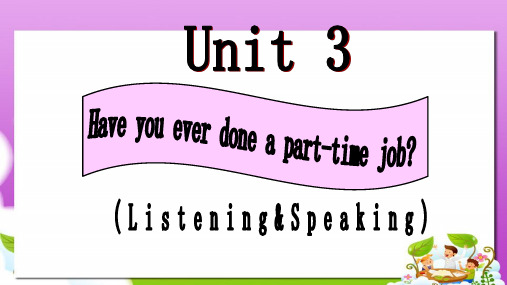
3.制作音频文 件
Have you ever done a part-time job?
(三)
情 景 应 用45'
I.观看实景 面试视频
Have you ever done a part-time job?
Li Xiaohong: Well, I am a great team player and I can work with other people very well. And I have great communication skills.
Interviewer: Why do you want to work for our company?
•
2、不要看书,要看老师的眼睛
•
只要老师不是在一味地读教材,那老师的“话”就不可能和你低头看着的教材上的“文字”一致。头脑聪明的学生,也许能做到既集中精神听老师的话,又集中精神看眼前书上的内容。可是实际上大部分的学生都做不到这一点。
•
认真听讲的第一个阶段就是上课时间无条件地“往前看”,上课的时候看书往往很容易开小差。摒除杂念,将视线从摊在眼前的书上移开。老师讲课的时候只看前面,集中注意力听老师嘴里说出来的话,那才是认真听讲的态度。
(二)
新 知 探 究
33'
单词 (二)
对话
数字故事
句型
几个月前,我参加 了一 个
招聘会
a job fair
有一份job非常不错,
就是……
要求English要好
面试官 是个美女姐姐, 她让我翻译 一份
七年级下册英语unit3笔记

七年级下册英语unit3笔记Understanding the intricacies of a language can be both an exciting adventure and a rigorous academic pursuit. As we delve into the third unit of the seventh-grade English curriculum, we embark on a journey that takes us through the complexities of grammar, the richness of vocabulary, and the nuances of language use.The unit begins with a focus on the present perfect tense, a critical aspect of English grammar that allows speakers to describe actions that have occurred at an unspecified time in the past or that started in the past and continue into the present. The structure of the present perfect tense is straightforward, involving the auxiliary verb "have" or "has" followed by the past participle of the main verb. For example, "She has traveled to three countries this year" indicates that the traveling occurred at some point in the past, with the exact time being unimportant.Vocabulary development is another cornerstone of this unit. Students are introduced to a plethora of new words, each with its own shades of meaning and usage. Learning these words in context is essential, as it aids in understanding not only the definition but also the application of each word. For instance, the word "meticulous" describes someone who is extremely careful about details, and it might be used in a sentence like, "The meticulous student carefully checked every answer before submitting the test."In addition to grammar and vocabulary, the unit emphasizes the importance of language functions, such as making requests, giving advice, and expressing necessity. These functions are integral to effective communication and are practiced through various dialogues and role-play scenarios. For example, when making a request, one might say, "Could you please lend me your book?" whereas giving advice could be framed as, "You should study for at least two hours each night."The unit also explores the art of writing, guiding students through the process of crafting well-structured paragraphs. Each paragraph should have a clear topic sentence, supporting details, and a concluding sentence that reinforces the main idea. This structure ensures that the writing is coherent and that each paragraph flows smoothly into the next.Reading comprehension is not overlooked, with students engaging with texts that challenge their understanding and encourage critical thinking. Questions following the texts prompt students to analyze, infer, and draw conclusions, thereby enhancing their analytical skills.Finally, the unit addresses the cultural aspects of language learning. Students are exposed to various English-speaking cultures, learning about customs, traditions, and ways of life that may differ from their own. This cultural awareness fosters empathy and broadens students' global perspective.In summary, the third unit of the seventh-grade English curriculum is a comprehensive blend of grammar, vocabulary, language functions, writing, reading, and cultural studies. It is designed to equip students with the skills necessary for effective communication and to instill a lifelong appreciation for the English language. Through consistent practice and engagement with the material, students can expect to achieve a greater command of English and a deeper understanding of the world around them. 。
unit3Have-you-ever-done-a-parttime-job市公开课一等奖省赛课微课
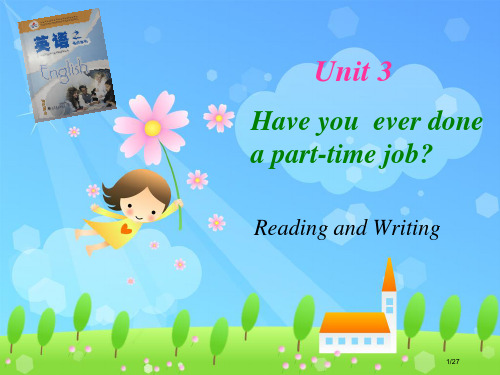
Please visit our website for more information
How is your learning?
good
so-so
not good
15/27
Step Ⅴ Summary (5mins) Make comments
Hand out presents
16/27
Step Ⅵ Homework (1min)
10/27
Step Ⅱ Pre-reading (8 mins)
The contents of job advertisement
Words
organization company communication website experience pressure
11/27
Step Ⅲ While- Reading(13mins)
According to the new standard curriculum
Knowledge
a) Words
b) Sentence patterns
Ability
a) Understand b) Write
Emotion
Find self ability and direction of effort
19/27
20/27
Step Ⅲ While-Reading
Read and complete
Organization Position Website address Qualities
21/27
Step Ⅲ While-Reading
Read and tick
( )1. have at least two-year work experience in this field. ( ) 2. speak fluent English. ( ) 3. have good communication skills. ( ) 4. be able to work under pressure. ( ) 5. Good computer skills. ( ) 6. Willing to work on weekends.
初三英语unit3优秀范文珠海版

初三英语unit3优秀范文珠海版Unit 3Part 1Listening1. Listening for specific information- Listen to the recording and answer the questions.- Make sure to pay attention to the details and take notes if necessary.2. Listening for main ideas- Listen to the recording and summarize the main points.3. Listening for inference- Listen to the recording and make inferences based on the information provided.Speaking1. Expressing opinions- Discuss the topic with a partner and share your thoughts.- Use language to express your opinions clearly and convincingly.2. Giving a short presentation- Prepare a short presentation on a given topic and deliver it to the class.- Use appropriate language and speaking techniques to engage your audience.3. Role-play- Act out a given scenario with a partner, using appropriate language and expressions.Reading1. Reading for specific information- Read the text and answer the questions to demonstrate your understanding of the content.2. Reading for main ideas- Summarize the main points of the text and discuss witha partner.3. Reading for inference- Make inferences based on the information provided in the text and discuss with a partner.Writing1. Writing a personal response- Write a personal response to a given topic, expressing your thoughts and feelings.2. Descriptive writing- Write a descriptive paragraph or short story based on a given prompt.3. Opinion writing- Write an opinion piece on a specific topic, using persuasive language and supporting your arguments with evidence.Grammar1. Review of tenses- Practice using different tenses in context, including present, past, and future tenses.2. Sentence structure- Practice creating different types of sentences, including simple, compound, and complex sentences.3. Parts of speech- Review and practice identifying different parts of speech, including nouns, verbs, adjectives, adverbs, and prepositions.Vocabulary1. Word families and collocations- Practice using words in different forms and identifying common collocations.2. Contextual vocabulary- Use context clues to determine the meaning ofunfamiliar words in a given text.3. Synonyms and antonyms- Practice identifying synonyms and antonyms of given words and using them in context.。
2020新译林版高中英语必修三unit3课文原文Word( 可编辑)
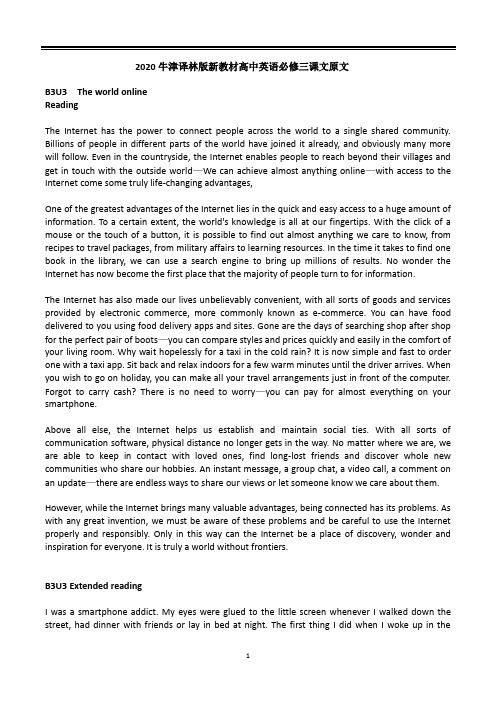
2020牛津译林版新教材高中英语必修三课文原文B3U3 The world onlineReadingThe Internet has the power to connect people across the world to a single shared community. Billions of people in different parts of the world have joined it already, and obviously many more will follow. Even in the countryside, the Internet enables people to reach beyond their villages and get in touch with the outside world—We can achieve almost anything online—with access to the Internet come some truly life-changing advantages,One of the greatest advantages of the Internet lies in the quick and easy access to a huge amount of information. To a certain extent, the world's knowledge is all at our fingertips. With the click of a mouse or the touch of a button, it is possible to find out almost anything we care to know, from recipes to travel packages, from military affairs to learning resources. In the time it takes to find one book in the library, we can use a search engine to bring up millions of results. No wonder the Internet has now become the first place that the majority of people turn to for information.The Internet has also made our lives unbelievably convenient, with all sorts of goods and services provided by electronic commerce, more commonly known as e-commerce. You can have food delivered to you using food delivery apps and sites. Gone are the days of searching shop after shop for the perfect pair of boots—you can compare styles and prices quickly and easily in the comfort of your living room. Why wait hopelessly for a taxi in the cold rain? It is now simple and fast to order one with a taxi app. Sit back and relax indoors for a few warm minutes until the driver arrives. When you wish to go on holiday, you can make all your travel arrangements just in front of the computer. Forgot to carry cash? There is no need to worry—you can pay for almost everything on your smartphone.Above all else, the Internet helps us establish and maintain social ties. With all sorts of communication software, physical distance no longer gets in the way. No matter where we are, we are able to keep in contact with loved ones, find long-lost friends and discover whole new communities who share our hobbies. An instant message, a group chat, a video call, a comment on an update—there are endless ways to share our views or let someone know we care about them. However, while the Internet brings many valuable advantages, being connected has its problems. As with any great invention, we must be aware of these problems and be careful to use the Internet properly and responsibly. Only in this way can the Internet be a place of discovery, wonder and inspiration for everyone. It is truly a world without frontiers.B3U3 Extended readingI was a smartphone addict. My eyes were glued to the little screen whenever I walked down the street, had dinner with friends or lay in bed at night. The first thing I did when I woke up in themorning was reach for my phone. I always asked for Wi-Fi connections when I went to a new restaurant or coffee shop. A dead battery in my smartphone would make me feel stressed. Sometimes I had the uncomfortable feeling that this little machine had taken up too much of my time, and that I could have done something more meaningful than just looking at a tiny screen all day. Sliding into the habit was easy, but it was difficult to quit the habit.Then the day came when I finally realized I had to make a change. Head down, eyes on my smartphone, I stepped into the road and a car shot past, nearly knocking me off my feet! At that very moment, I made up my mind to spend a whole week without my smartphone.The first day was the hardest. I was used to checking the news and my friends' social media updates every few minutes, but now I did not know what to do with myself. I kept reaching for my pocket, for my smartphone that was not there. I felt lost and anxious, as if I had missed something of value. Very soon, time slowed down. The empty hours stretched out in front of me, and I felt disconnected from everyone and everything.It was scary at first. Then somehow I began to feel free. The things that I had time for! I finally picked up the classic novel I had always wanted to read and was soon lost in the beautiful language.I kept a journal of my feelings, thoughts and daily activities to see how much progress I was making.I went out for a run and felt more alive than I had in days. The details of the scene were revealed in front of me: the soft sunlight, a bird singing from a high tree branch, the rich and earthy smell of the soil after the rain. Best of all, I began to appreciate the beauty in life with my own eyes, instead of through my smartphone camera.My offline relationships benefited as well. I went for a long walk with an old friend. Our wide-ranging conversation went so much deeper than brief texts ever could. With eyes no longer fixed on our phones, we had a chance to really enjoy each other's company. I also made sure to spend more time with my parents. We went to the opera, played badminton, and visited museums. One night, my mother took out some family photos and we laughed about old times. I brought them up to date with what was going on in my life. We had never felt closer to each other.By the end of the week, I almost did not want to turn my phone back on. Those seven days have given me a great appreciation for life beyond the screen. Real life—and real relationships—are more important to me now. I cannot escape from the modern world, but I can cut back on the amount of time I spend on my smartphone every day, and I do. Life beyond smartphones is richer and more beautiful, and I am going to take advantage of it.。
Unit 3 Have you ever done a part
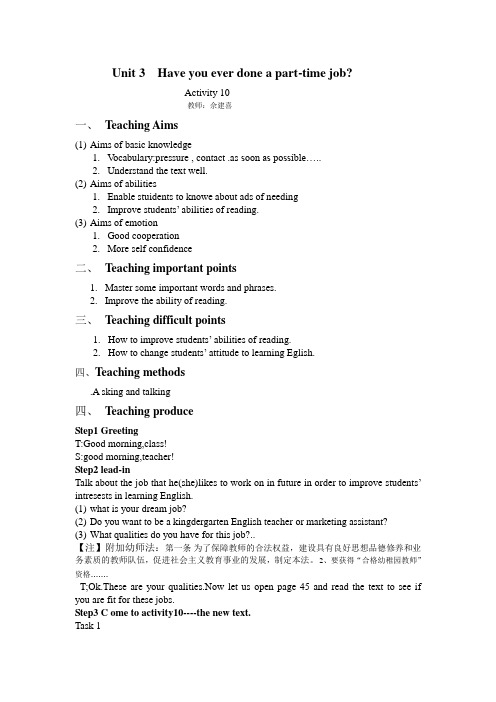
Unit 3 Have you ever done a part-time job?Activity 10教师:佘建喜一、Teaching Aims(1)Aims of basic knowledge1.V ocabulary:pressure , contact .as soon as possible…..2.Understand the text well.(2)Aims of abilities1.Enable stuidents to knowe about ads of needing2.Improve students’ abilities of reading.(3)Aims of emotion1.Good cooperation2.More self confidence二、Teaching important points1.Master some important words and phrases.2.Improve the ability of reading.三、Teaching difficult points1.How to improve students’ abilities of reading.2.How to change students’ attitude to learning Eglish.四、Teaching methods.A sking and talking四、Teaching produceStep1 GreetingT:Good morning,class!S:good morning,teacher!Step2 lead-inTalk about the job that he(she)likes to work on in future in order to improve students’intresests in learning English.(1)what is your dream job?(2)Do you want to be a kingdergarten English teacher or marketing assistant?(3)What qualities do you have for this job?..【注】附加幼师法:第一条为了保障教师的合法权益,建设具有良好思想品德修养和业务素质的教师队伍,促进社会主义教育事业的发展,制定本法。
中职英语Unit3-现在完成时
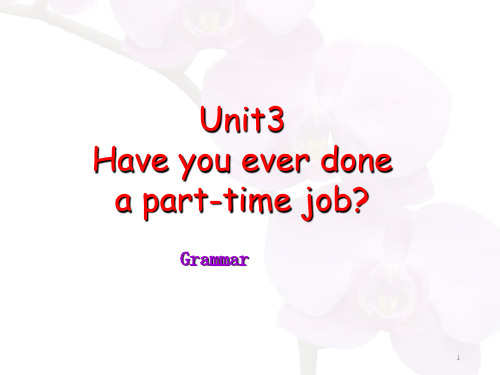
Describe the pictures to show what Sara has done recently.
study English / in an evening school / for 3 months
Sara has studied English in an evening school for
1. I/graduate/vocational school
I have graduated from a vocational school.
2. My father/start/a new job
My father has started a new job.
15
Finish the letter.
常与for, since引导的时间短语或从句连用.
for+时间段 since+时间点 , since+句子
6
常用于现在完成时的时间副词、介词:
already (已经): 用于肯定句 I have already posted the letter. yet(还): 用于否定句,疑问句 He hasn’t done his homework yet. just(刚刚) They have just left. ever(曾经) Have you ever been to Beijing ? never(从不) I have never seen him.
back next week.
24
25
1. 他的爷爷已经去世2年了。
His grandpa has died for 2 years.
X
2. Nick 参军3年了.
Nick has joined the army for 3 years. X
- 1、下载文档前请自行甄别文档内容的完整性,平台不提供额外的编辑、内容补充、找答案等附加服务。
- 2、"仅部分预览"的文档,不可在线预览部分如存在完整性等问题,可反馈申请退款(可完整预览的文档不适用该条件!)。
- 3、如文档侵犯您的权益,请联系客服反馈,我们会尽快为您处理(人工客服工作时间:9:00-18:30)。
unit3-Have-you-ever-done-a-part-time-job教学设计Unit 3 Have you ever done a part-time job?教学设计【课题】高等教育出版社《英语基础模块2》第3单元Unit 3 Have you ever donea part-time job?第一课时Lead-in & Listening andspeaking【课时】45分钟【设计理念】围绕“工作”主题,通过头脑风暴,唤醒学生头脑中的相关词汇,再谈到工作需要技能,你的优势在哪里。
找工作有几个步骤?如何为面试做好准备?层层递进,步步提问,再以李晓红参加面试为例,学习如何在面试中有好的表现。
以问题为导向,以任务为驱动,创设情境,让学生在做中学,做中练,做中掌握。
【教材分析】本课时系教材《英语基础模块2》第三单元的第一课时,包括Lead-in & Listening and speaking两部分,具体内容为:职业名称、性格、才能等词汇和面试常用语句,要求学生能掌握大部分的职业名称和性格才能的词汇,听懂面试对话,掌握面试常见的基本句式,并运用基本句型进行模拟面试。
【学情分析】本课时的教学对象为外贸专业学生,女生为主,英语基础参差不齐。
个别学生对英语学习有积极性,大半数学生学习较被动对英语学习缺乏自信心和兴趣,男生英语基础很薄弱,很难开口表达。
需要教师的引导和启发。
【教学目标】1.知识目标⑴掌握职业和性格才能的词汇,如:salesperson,actor/actress,secretary,typist, clothes designer, kindergartenteacher; creative, confident, outgoing,good at sports, good with hands, canspeak good English等(2)掌握面试时的常用语,如:Could you tell me something about yourself? I am…I’ll graduate…Have you ever done a part-time job? Yes, I have worked as… in…for…What are your strong points? I can…; Ihave…; I’m good at…Why do you want to work for us? I have visited your website. I think it’s…2.能力目标⑴学生能听懂,读懂面试对话。
⑵学生能运用所学的语言和句型进行模拟面试。
3.情感目标(1)让学生了解职业需要技能,明确自己的优势,为梦想的工作努力。
(2)让学生认识英语的实用性,提高对英语的兴趣。
【重难点】⑴教学重点:听懂,读懂的面试对话;掌握相关的词汇和句型。
⑵教学难点:能用所学的词汇和句型进行模拟面试。
【教学方法及策略】1.听说教学法2.情景教学法3.任务驱动、合作学习【教学平台及资源】多媒体教学设备,多媒体课件,黑板【教学过程】Step 1: Lead-in (10m)1. Look and guess.Have the students look at the pictures and guess what they are doing.T:Boys and girls, please look at the pictures and guess what they are doing.2. Brainstorm:jobsStudents will recall jobs they know as many as possible. Then show some pictures about special jobs that they may not know or have something difficulty.T: Quite good! There are some jobs here.Do you know what they are?(kindergarten teacher, sportsman, computer operator, clothes designer)(设计意图:运用头脑风暴激活学生旧知,图片展示新的工作,吸引学生注意力,解决难点输入新知。
)3. Introduce strong pointsFirst, show some strong points and let students translate them. Then, ask students to match the strong points with different jobs.T: There are so many jobs in the world, but it is not easy to find a good job. You must have some strong points. Do you know what strong points mean? Let see some of them(设计意图:展示优势的表达,让学生熟悉并掌握表达个人优势的短语,为下面的语言输出做准备。
)4. Match strong points with jobs.T: Different jobs need different abilities. If you have some strong points, it will be easy for you to get a good job. Now, let’s see what their strong points are.A taxi driver is.A sportsman is.A secretary is.A salesperson is.A kindergarten teacher is .(设计意图:让学生明确不同的职业需要不同的优势的人,运用优势短语进行表达,为下面的语言输出做铺垫。
)Step 2: Listening (16m)1.Pre-listening: How to find a jobLook forjobinformationT: Do you know how to find a job?There are four steps. What is the third step? It’s have an interview. If you do well in the interview, you well get the job more easily. Let’s see how Li Xiaohong does in her interview.2.While-listeningTask1. Listen and tick.Where does the dialogue take place?Task2. True or false.Students listen to the dialogue again and decide whether the statements are true or false. Ask individual student to give their answers and have a check.Task3. Listen and tick.Students listen again and tick what Li Xiaohong’s strong points are.Task 4. Listen and completeStudents listen for the last time and completethe dialogue.(设计意图: 这四个活动旨在训练学生在听的过程中识别捕捉信息的能力,同时通过反复的听让学生熟悉面试的用语。
)3.A fter listening1) Find out the interview questions T:Class, from the dialogue, what questions are asked by the interviewer? Please find out them?a. Could you tell me something about yourself?b. Have you ever done a part-time job?c. What are your strong points?d. Why do you want to work for our company、2) How to answer interview questions T: We have found these useful interview questions. Please think for a minute and try to find some ways to answer them. (设计意图: 通过落实面试问题和面试回答的基本结构,让学生更好的掌握面试用语,为后面的口语活动做准备。
)Step3: Speaking (10m)Talk and act.SecretaryApplicants arerequired:Have the students make a similar dialogue according to the given information and useful expressions.T: A secretary is wanted. There are some requirements such as work experience, abilities and skills. Please work with your partner and make a similar dialogue of the interview. You’ll have 3 minutes to prepare and some groups are invited to give your performance.(设计意图:设计情景,让学生运用所学知识模拟面试场景,更好的感受语言的真实性和实用性。
考察学生的合作能力,语言表达能力和表现力。
)Step4: Summary and self check (7m)Make a short summary of what we’ve learned today.T: What do you learn in this class? Please think for a moment and talk bout it. You can start from three aspects.Jobs:Strong points:Interview:(设计意图:让学生总结本堂课重点,加深印象,也考察学生的掌握情况。
